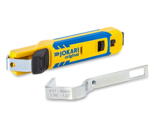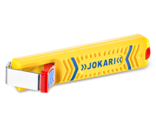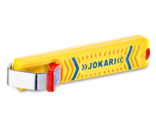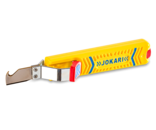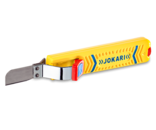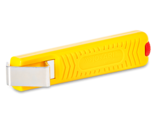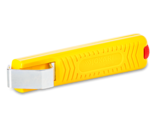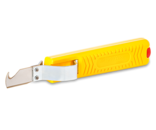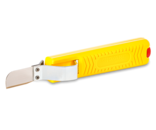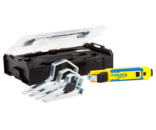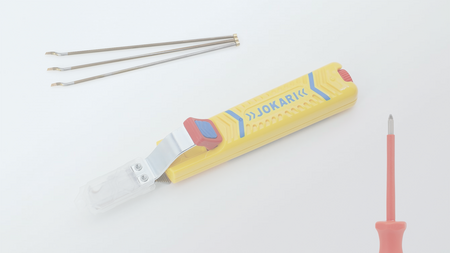JOKARI Cable Knife
From the traditional, patented JOKARI Knife to the newly developed safety Cable Knife.
The “JOKARI knife” – proven millions of times around the globe
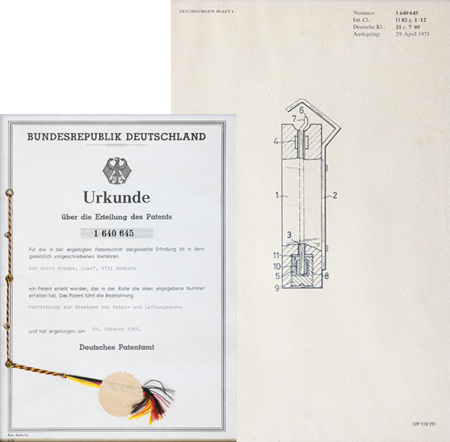
Did you already knew? In 1966, JOKARI received the world's first patent for the revolutionary JOKARI knife and is therefore the inventor of the cable knife.
This special wire stripping knife replaces the cutter knife, carpet knife or side cutter for cable stripping work. The use of these tools for cable processing is not recommended as the risk of injury to the user and the internal wires is very high.
A long service life, simple and time-saving application, extremely precise cable stripping results and 100% Made in Germany - these features of the JOKARI cable knife are convincing.
FAQs
The range of wire stripping tools is huge. How do I find the right wire stripper for me?
Which wire stripping tool is most suitable to professionally process a specific cable type? The JOKARI cable database gives the right answer to this question. It supports the user in finding a professional solution quickly and easily. The user enters the cable type into the search field and receives suggestions for the right JOKARI wire stripping tool from thousands of data sets within seconds.
Further interesting information on the topic of cableknife can be found on JO!STORY, the JOKARI blog.
What is the difference between a cable knife, cable stripper or wire stripper?
A cable knife is an electrician's traditional, conventional tool for strip a long length of cable insulation lengthwise for convenient access to the inner conductors.
Cable strippers are ideal for working in deeper levels like in wall outlets. There is usually limited space available to remove the outer cable insulation. A cable knife can sometimes not be used due to the lack of space. Many cable strippers also have a function for safely stripping the individual wires. Their working range starts at 0.8mm2 – the smallest working range of cable knives is 4mm ø.
The maximum cable diameter that cable strippers can used for is 15mm ø. For larger cables (up to 70mm ø) cable knives are more likely to be used.
Wire strippers with their shape of a pistol are perfect for automatically processing the inner conductors in order to connect a lamp or socket, for example.
All you have to do is insert the inner conductor into the pliers and press them. The insulation is automatically stripped by the blade mechanism.
Which cable knife models does JOKARI have?
The JOKARI range offers different cable knife designs for processing the most common round cable types (e.g. NYM or NYY cables).
In addition to the proven Standard and Secura cable knives, the user will also find with a safety cable cutter with the Cable Knife System 4-70. With the newly developed protective mechanism, cut injuries are a thing of the past. In addition, thanks to the intelligent bracket change system, one tool is all you need to strip the most common cable types, from 4 to 70 mm ø.
What should be considered when buying a cable knife?
A good cable knife should have a good quality blade. This should not only be very sharp, but also be made of a good and stable material. All JOKARI cable knives are equipped with high-quality steel blades from Solingen.
Did you already knew? A spare blade is built into the inner of all JOKARI cable knives.
Changing the blade is very easy and can be done in just a few moments.
How are cable knives used?
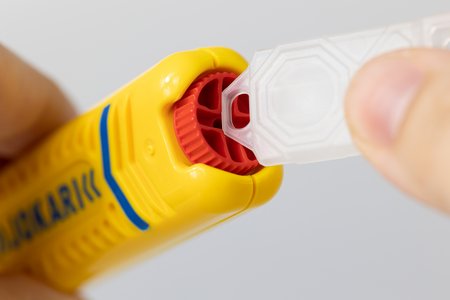
Step 1: First, the cutting depth of the cable knife is set with the help of the adjusting screw so that the insulation is just not completely severed. This ensures that the insulation of the inner conductors remains undamaged.
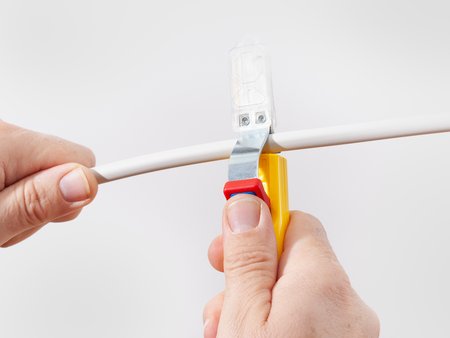
Step 2: The cable is inserted between the inner knife and the bracket at the required stripping length by sliding the pressure bracket on. The inner knife is pierced into the cable sheath by gently pressing on the bracket.
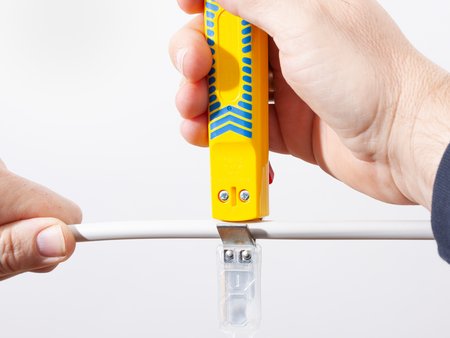
Step 3: First a simple circular cut is made. This is done by rotating the cable knife around the cable.
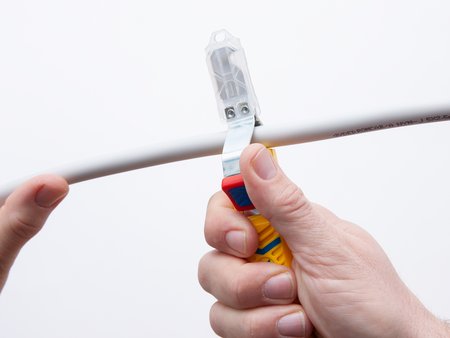
Step 4: A longitudinal cut can then be made seamlessly. The cable sheat can now be easily broken and removed.
The inner knife is freely rotatable. The blade geometry ensures that cuts are made in the desired direction (round or longitudinal cut). The tool does not have to be removed because it simply follows the user's hand movements.
Even cutting longer stretches of cable is no problem with a JOKARI cable knife.
How is a cable knife constructed?
A modern cable knife consists of a plastic handle, a holding device for the cable and a knife for cutting the cable insulation with a circular and longitudinal cut.
The handle of the modern version of this tool is so designed in such a way that the user has the most secure grip possible, which enables clean cable routing. The pressure bracket on the top of the cable knife pulls the cable securely to the inner knife and, together with the handle, ensures that the cable knife is guided precisely.
What are cable knives used for?
Cable knives are used in the field of cable processing. They make it easier for the user to remove the outer cable insulation without damaging the inner conductors and are needed every day in the daily routine of many professional users, for example in house installations.
